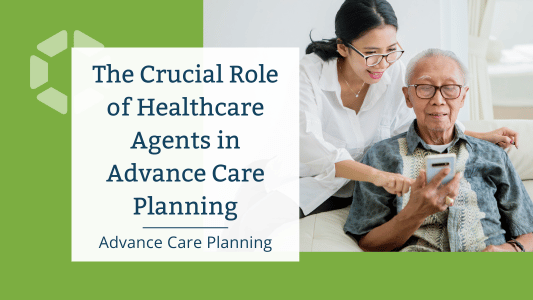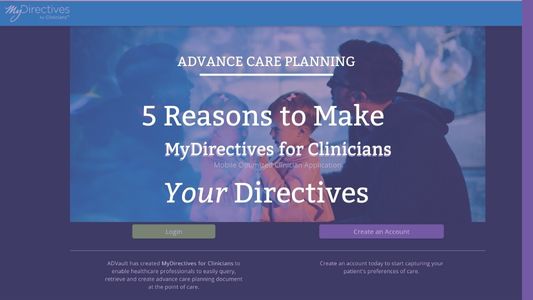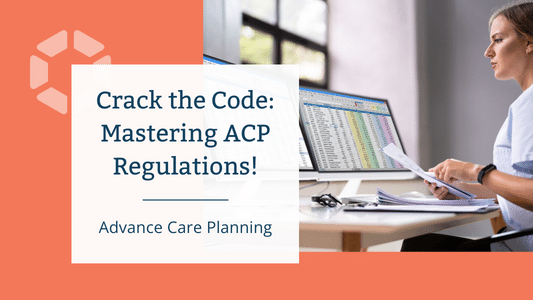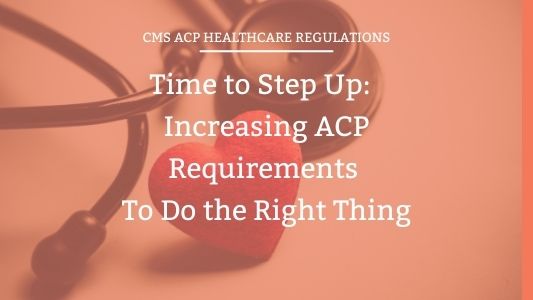
Part Two of Our Six-part Series: Confronting Advance Care Planning Misconceptions
Welcome back to our informative blog series on Advance Care Planning (ACP) controversies. In our first post – Managing the Unavoidable Conversation: Addressing Mortality – we explored the importance of normalizing ACP conversations and how technology can revolutionize the process. Today, we shift our attention towards the critical importance of sharing lifecycle choices with a trusted surrogate that can speak for the patient, resident, or member should they be unable to communicate with loved ones and their medical team.
Consider, for example, the mayhem brought by the recent pandemic. Many adults survived the virus but never had an informed conversation about potential outcomes or chances of recovery. The only certainty amidst the chaotic ordeal was the proxy—the designated person with the authority to make care decisions based on their understanding of the patient's wishes. And while written directives have been embroiled in controversy, experts universally agree on one ACP component—naming a health care surrogate or proxy.
“Who would express their healthcare wishes when they are unable to do so?”
But who should express someone’s healthcare wishes when they are unable to do so? This thought alone might make some shudder, yet it's an essential question to address and a step that is often missed or ignored, with severe consequences. This article aims to underline the necessity of choosing and preparing a trusted healthcare surrogate, someone entrusted to communicate one’s medical goals, treatment priorities, and care preferences when they cannot do so for themselves.
Why name a healthcare agent?
Healthcare agents come into play when an individual’s capacity to communicate or make decisions diminishes. The surrogate, acting on behalf of the patient, will invoke “substituted judgment.” They are expected to make the decisions the patient would make if they were capable, based on the patient's prior documented preferences and ACP discussions.
The advance care planning process assists patients, residents, and members in selecting this advocate, someone who can interpret and articulate one’s values to inform in-the-moment decisions when an individual is unable to do so. When done well, ACP discussions enable a seamless transition of decision-making from the patient to the healthcare agent.
A healthcare surrogate: it’s more than just a name.
Selecting a surrogate is a process that demands introspection, dialogue, and contemplation. It isn't about picking a name from a hat. It's about finding someone who understands and trusts the person’s decisions and will be courageous enough to uphold them even during strenuous circumstances. It’s best when these educational conversations are held with key stakeholders, including patients, their families, doctors, and even those outside the healthcare sector. Keep in mind ACP conversations are not about pushing patients to make hasty decisions regarding possible treatments. Instead, discussions should focus on creating a network of understanding and empathy that bridges the gap between what the patient wants and what the surrogate decides when the time comes.
Dr. Tulsky, co-chair of a roundtable on care for people with serious illnesses for the National Academies of Sciences, Engineering and Medicine, wisely noted that, the designated person may not always be a spouse, child, family member or friend. The crucial ingredient is trust. It should be someone capable of navigating difficult circumstances while adhering to an individual’s wishes. Regular, open conversations with the advocate about what matters most and updating them as circumstances or preferences change are vital steps towards ensuring that wishes are honored.
The paradox of choosing a healthcare agent.
While many seriously ill individuals instinctively wish to protect their loved ones from making difficult choices, this well-intentioned silence or lack of accessible documents can unintentionally complicate matters even more. This common paradox underscores the vital need for a comprehensive ACP process that extends beyond simply predicting a person's end-of-life desires. Instead, greater focus should be on enlightening advocates who may have to make decisions on their behalf, to ensure one’s wishes are accurately communicated and understood. A systemic approach to ACP discussions, documentation, and storage is vital to alleviate undue stress and foster informed, respectful decisions during a challenging time.
Sadly, very few engage in discussions about their advance directive with their families or clinical teams. Consequently, healthcare agents often grapple with making sense of patients' past hypothetical discussions, disentangling their own preferences and emotions, and challenging physicians who recommend different treatments. These issues stem from a lack of open dialogue and transparency about one’s preferences, compounded by the elusive nature of advance directive documentation.
The art of ACP conversations: building a bridge to mutual understanding.
The main objective of ACP has evolved to helping individuals navigate complex decisions when they become seriously ill, as stressed in the A new paradigm is needed: Top experts question the value of advance care planning article by Dr. Jo Paladino, associate director of research and implementation for the Serious Illness Care Program at Ariadne Labs. Dr. Paladino emphasized their research shows that when people with serious illnesses engage in such discussions, they experience less anxiety, feel more in control of their care, and are better prepared for the future.
This shift in perspective from decision-making to robust discussion was also echoed by Dr. J. Randall Curtis, director of Cambia Palliative Care Center for Excellence at the University of Washington, who was diagnosed with an incurable neurological condition. With regard to his own diagnosis, Dr. Curtis admitted, “I have not made very many specific decisions yet, but I feel like these [ACP] discussions bring me comfort and prepare me for making decisions later.” Such deeply meaningful unmeasurable benefits of ACP should be considered when evaluating any ACP program’s effectiveness.
Studies have, in fact, revealed that surrogates of patients who have used ACP make better-informed decisions about what the patients would have wanted compared to those who did not use ACP. Evidence also suggests that ACP reduces fear, depression, and emotional distress in surrogates during the grieving process.
Innovative technology to empower healthcare agents for future decision-making.
It's time to capitalize on technology to address the elephant in the room and promote open conversations about healthcare wishes. Today, innovation leaders are harnessing technology to:
- Simplify the process of naming a healthcare agent,
- Make sure surrogates comprehend a person's values, and
- Capture essential contact information and healthcare wishes for use in an emergency.
Best practice software solutions like MyDirectives for Clinicians™ (MyDC) exist to do all these things. Leveraging MyDC advance care planning tools gives everyone peace of mind and greater clarity in an otherwise unfamiliar and all too daunting journey.
In conclusion, preparing for life's final chapter need not be a daunting task filled with anxiety and uncertainty. Instead, with careful planning, open discussions, and the right healthcare surrogate, it can be a journey navigated with dignity, respect, and peace. After all, every individual deserves the right to have their wishes heard, respected, and fulfilled, even when they can't voice them for themselves.
Next in our ACP exploration.
In our subsequent blog post– Revolutionizing Advance Care Planning Documentation: More Power to Patients! – we'll delve into the importance of crafting comprehensive and specific advance directives that accurately mirror individuals' healthcare preferences. Accompany us as we examine the challenges and potential solutions in creating effective advance directives that serve as dependable navigators for end-of-life care decisions.
Let’s get started on digital ACP together
Secure, Interoperable, Accessible.
MyDirectives offers the only digital advance care planning (ACP) tools and interoperable cloud-based storage that is HITRUST Risk-Based 2-year Certified.






